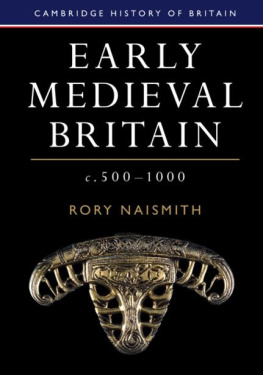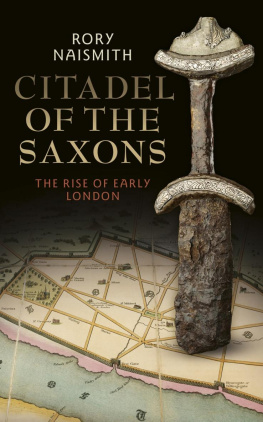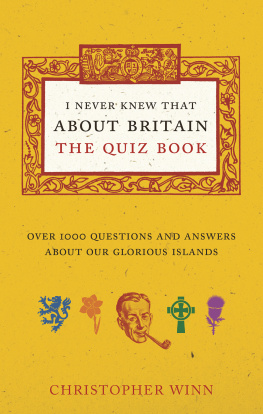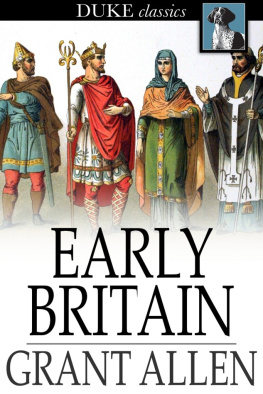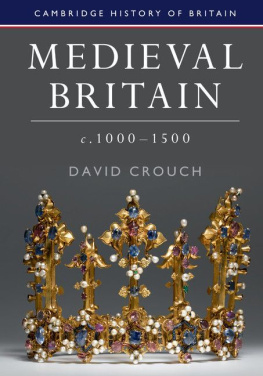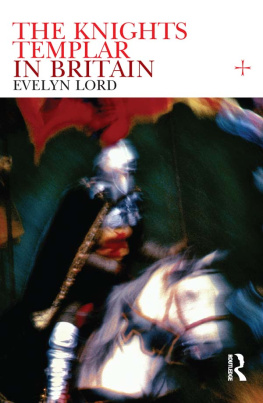Rory Naismith - Early Medieval Britain, c. 500–1000 (Cambridge History of Britain)
Here you can read online Rory Naismith - Early Medieval Britain, c. 500–1000 (Cambridge History of Britain) full text of the book (entire story) in english for free. Download pdf and epub, get meaning, cover and reviews about this ebook. year: 2021, publisher: Cambridge University Press, genre: Religion. Description of the work, (preface) as well as reviews are available. Best literature library LitArk.com created for fans of good reading and offers a wide selection of genres:
Romance novel
Science fiction
Adventure
Detective
Science
History
Home and family
Prose
Art
Politics
Computer
Non-fiction
Religion
Business
Children
Humor
Choose a favorite category and find really read worthwhile books. Enjoy immersion in the world of imagination, feel the emotions of the characters or learn something new for yourself, make an fascinating discovery.
- Book:Early Medieval Britain, c. 500–1000 (Cambridge History of Britain)
- Author:
- Publisher:Cambridge University Press
- Genre:
- Year:2021
- Rating:3 / 5
- Favourites:Add to favourites
- Your mark:
- 60
- 1
- 2
- 3
- 4
- 5
Early Medieval Britain, c. 500–1000 (Cambridge History of Britain): summary, description and annotation
We offer to read an annotation, description, summary or preface (depends on what the author of the book "Early Medieval Britain, c. 500–1000 (Cambridge History of Britain)" wrote himself). If you haven't found the necessary information about the book — write in the comments, we will try to find it.
Early Medieval Britain, c. 500–1000 (Cambridge History of Britain) — read online for free the complete book (whole text) full work
Below is the text of the book, divided by pages. System saving the place of the last page read, allows you to conveniently read the book "Early Medieval Britain, c. 500–1000 (Cambridge History of Britain)" online for free, without having to search again every time where you left off. Put a bookmark, and you can go to the page where you finished reading at any time.
Font size:
Interval:
Bookmark:
Early Medieval Britain, c . 5001000
Blending an engaging narrative with clear explanations of key themes and sources, this undergraduate textbook deconstructs the early history of Britains island nations within an accessible framework. Using extensive illustrations, maps and selections from crucial primary sources, students will examine the island as a collective entity, comparing political histories and institutions as well as societies, beliefs and economies. Each chapter foregrounds questions of identity and the meaning of Britain in this period, encouraging interrogation and contextualisation of sources, including the latest debates and problems. Featuring timelines, a glossary, end of chapter questions, suggestions for further reading and a companion website, students can drive their own understanding of how the polities and societies of early medieval Britain fitted together and into the wider world, and firmly grasp the formative stages and developments of British history.
Rory Naismith has published extensively on early medieval history, including Money and Power in Anglo-Saxon England: The Southern English Kingdoms 757865 (2012), Medieval European Coinage 8: Britain and Ireland c. 4001066 (2017) and Citadel of the Saxons: The Rise of Early London (2018).
The Cambridge History of Britain is an innovative new textbookseries covering the whole of British history from the breakdown ofRoman power to the present day. The series is aimed at first-yearundergraduates and above, and volumes in the series will serve both asindispensable works of synthesis and as original interpretations ofBritains past. Each volume will offer an accessible survey of political,social, cultural and economic history, charting the changing shape ofBritain as a result of the gradual integration of the four kingdoms andBritains increasing interaction and exchange with Europe and thewider world. Each volume will also feature boxes, illustrations, maps,timelines and guides to further reading as well as a companionwebsite with further primary source and illustrative materials.
volumes in the series
I Early Medieval Britain
II Medieval Britain, c. 10001500
III Early Modern Britain: 14501750
IV Modern Britain: 1750 to the Present
Early Medieval Britain, c . 5001000
Rory Naismith
University of Cambridge


University Printing House, Cambridge cb 2 8 bs , United Kingdom
One Liberty Plaza, 20th Floor, New York, ny 10006, USA
477 Williamstown Road, Port Melbourne, vic 3207, Australia
314321, 3rd Floor, Plot 3, Splendor Forum, Jasola District Centre, New Delhi 110025, India
79 Anson Road, #0604/06, Singapore 079906
Cambridge University Press is part of the University of Cambridge.
It furthers the Universitys mission by disseminating knowledge in the pursuit of education, learning, and research at the highest international levels of excellence.
www.cambridge.org
Information on this title: www.cambridge.org/9781108424448
doi : 10.1017/9781108335638
Cambridge University Press 2021
This publication is in copyright. Subject to statutory exception and to the provisions of relevant collective licensing agreements, no reproduction of any part may take place without the written permission of Cambridge University Press.
First published 2021
Printed in the United Kingdom by TJ Books Limited, Padstow Cornwall
A catalogue record for this publication is available from the British Library.
isbn 978-1-108-42444-8 Hardback
isbn 978-1-108-44025-7 Paperback
Additional resources for this publication at www.cambridge.org/highereducation/naismith
Cambridge University Press has no responsibility for the persistence or accuracy of URLs for external or third-party internet websites referred to in this publication and does not guarantee that any content on such websites is, or will remain, accurate or appropriate.
This volume is written to provide students with an introduction to early medieval Britain: what happened, why and how to understand where the information comes from. It gives an outline of key chronological developments, and looks at larger themes, including the idea of Britain and the islands place in contemporary Europe. The chapters are divided into three sections on Conceiving Early Medieval Britain (which concentrates on ideas), Making Early Medieval Britain (which concentrates on chronologically specific developments) and Living in Early Medieval Britain (which concentrates on broader cultural and social developments).
The book is, it should be stressed, about Britain, at a time when the island was divided by language, culture and politics. For that reason there is a lot of comparison: setting one area alongside others, with important differences in how they worked. I have sought to include examples and discussion from multiple parts of Britain in every chapter, but inevitably balance and coverage is uneven. This is a result, above all, of what sources survive from the period; for some parts of the island on some topics, virtually nothing is known. Certain areas are outside the remit of reliable written history for the entirety of this period. Conversely, some areas are very well covered. Where the balance in a given chapter swings more towards one region or tradition, it is partly a response to what is available, but also out of an effort to present a coherent and informative approach. I have, wherever possible, noted ways in which details from one region might reflect what was going on elsewhere in areas less favoured in their surviving sources.
A number of practical points should be laid out here. The first relates to language. Early medieval Britain had multiple languages, each with its own spelling conventions. These referred to the same people and places differently, and in some cases there are also separate conventions in modern scholarship depending on various national or disciplinary traditions. In this book, names of places and individuals are generally given in the most familiar modern English form: hence London for Londinium , Londonia , Lunden or Lundenburh , and Alfred the Great for lfrd . Rulers of Alba in the ninth and tenth centuries are often now referred to using the medieval Gaelic or Middle Irish form (e.g. Causantn or Constantn) in order to underline the dominant language of the kingdom at that time, though for the sake of clarity this volume will primarily use the modern English equivalent if one exists (e.g. Constantine).
Each chapter is set up to include an initial overview paragraph, which functions as an abstract. The main text is complemented by boxes, most of which contain extracts from key sources, or discussion of particular methods or issues. All are provided in translation, with a note in the caption of which language the original was in. At the end of each chapter will be found a selection of key texts. These are chosen to emphasise general issues raised in each chapter: a fuller list of further reading can be found at the end of this volume and on the associated website, including all works directly used in writing each chapter. Also at the end of each chapter is a series of points for discussion. These are not meant to have easy, simple answers: many of them are versions of the questions that professional historians are still tackling. They are meant as a starting point for broader thinking on the topic.
Font size:
Interval:
Bookmark:
Similar books «Early Medieval Britain, c. 500–1000 (Cambridge History of Britain)»
Look at similar books to Early Medieval Britain, c. 500–1000 (Cambridge History of Britain). We have selected literature similar in name and meaning in the hope of providing readers with more options to find new, interesting, not yet read works.
Discussion, reviews of the book Early Medieval Britain, c. 500–1000 (Cambridge History of Britain) and just readers' own opinions. Leave your comments, write what you think about the work, its meaning or the main characters. Specify what exactly you liked and what you didn't like, and why you think so.

